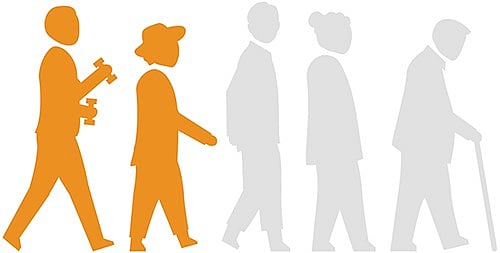There has been lots of discussion in both academic literature and
practical domain in regards to the concept of aging and its importance in
the life journey of an individual. Aging has classically been defined as the
“process of getting older”.
Getting older in terms of age or biological number is an inevitable and unavoidable fact of life. Along with physical aging, there is another dimension known as “psychological aging” which is more of a mental construct. It all depends on attitude of an individual.
Physical aging and psychological aging
Some people become mentally old and de-activated at the age of 60
while some others remain evergreen and mentally alert and agile at an
age of 80. One reason could be degree of mental alertness; but the
other important aspect is how one perceives journey of life meaning
“attitude towards life”. While a negative mindset may prompt one lonely /
depressed at a very common physical ailment, there could be others
with a strong sense of resilience who can withstand any amount of
pressure with a philosophical detachment.
Both these aspects of aging namely “physical” as well as “psychological”
need to be managed properly by the elders. There is one additional and important dimension in the whole context of aging. This relates to “stages of aging”. What it means is that aging for majority of elderly people is not a sudden event but a slow “evolving process” of more than 15 to 20 years. For the purpose of this discussion, we are considering the starting and end point of aging process from 60 (beginning of aging process) to 80 years (say end of life).
All these stages have their own uniqueness and special characteristics
and need distinguished techniques to manage. What is means is that
there is no “omnibus strategy” to manage the process of aging but we
need to have “targeted strategies” for each of these stages.
Stages of aging and their management:
1. Independent Stage: This is the starting phase of aging
commencing may be immediately after retirement (60 years) and
may span up to 65 to 70 years depending on body parameters.
This is the phase when a person is still active, physically &
mentally agile, socially, by and large, connected and still has a
feeling of “Youth” in him / her. He / she keeps himself / herself
busy in some activity or the other depending on one’s areas of
interest. He / she is also connected with family and friends. Barring
normal ailments associated with old age, the person is physically /
mentally fine.
Here strategy of the individual as well as family members will be to
extend this period as much as possible. The elderly should
concentrate on his / her area of interest, continue to remain
socially engaged and pursue 1 to 2 new areas of activity
depending on his / her passion & focus. Physical as well as mental
exercises need to be caried on religiously and all medicines
prescribed by doctor to be taken regularly. The individual should
also get himself / herself checked up regularly. Besides, the
person should try to make new friendships, become member of
some groups like walking clubs or senior citizen associations to
keep busy and engaged. Objective is simple: keep yourself active,
busy, and independent. There are lots of things to enjoy in life and
let’s go ahead with them. Life is a pleasurable journey and let’s
enjoy to the extent possible. This phase is what is classically
known as 2nd / 3rd phase of aging and meant for living a new life
that was unexplored.
2. Early Dependent Stage: This signifies beginning of “real old age
syndromes”: feeling weak, slight difficulties in taking brisk walks,
setting in impairment of mental faculty in terms of forgetting things,
developing “not feeling well” attitude, etc. Though the elder is still
able to do his / her own things fairly independently, he / she may
need external help in some tasks like crossing roads, getting
medicine, going to bank, to say a few. This phase of life is
inevitable and may set in at different times to individuals starting
from say, 70 plus years onwards.
First step in this situation should be to accept the reality and take it
as a part of life and not curse everyone for it. Old age has its own
problems with body parts giving way because of wear and tear.
The individual should try to extend this period as much as possible
by resorting to modest physical exercises / yoga (may be on bed /
chair) and also continue to do soft mental exercises / games to
keep cognitive faculties under control. However, it is time to accept
reality and take all steps to ensure that unforeseen things do not
happen like “accidental falls”. All infrastructure in living / bathroom
should be made elder friendly. The elder, if he / she can afford,
can think in terms of keeping a part-time caregiver. Role of family
in this is crucial. Even if they are not staying together, children
should connect with their aging parents once a week physically, if
possible. At least they should do video calling once a week to keep
their moods upbeat. Geriatric counselors also play an important
role in this phase.
3. Fully Dependent Stage: This is precursor to critical stage where
an individual is sick, bed ridden or mentally significantly impaired
and primary dependent on external support system. This is semi-
terminal stage of life.
At this stage, quality of life is severely impacted. The individual
may be totally dependent on caregiver, either family or external.
For mentally impaired elders, dementia may have set in. At this
stage, the entire responsibly rests on family members, government
and society. The strategy has to be macro focused with external
agencies playing a pivotal role. Professional old age homes,
palliative care centers all have their tasks cut out at this stage. All
of as socially responsible citizens need to take care of these elders
“who took care of us in yesteryears and not able to take care of
even themselves”.
Conclusions:
Aging and its stages may not always be as sequential as stated above.
There could be major downsize risks like onset of a life-threatening
disease or accidental fall or serious ailment like dementia. However, the
discussion on aging stages will definitely help many elders to prepare
suitably to face the challenges of life. Life journey has its own difficulties
in old age and we all need to be ready to face them. As life has its own
beauties and pleasure, so does it entail pain. It is, therefore, necessary
to know about the pain points of our life early so that we can get
mentally prepared for the same














